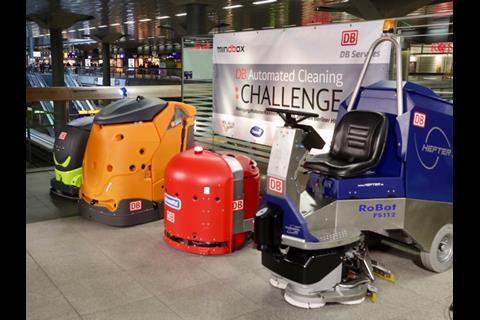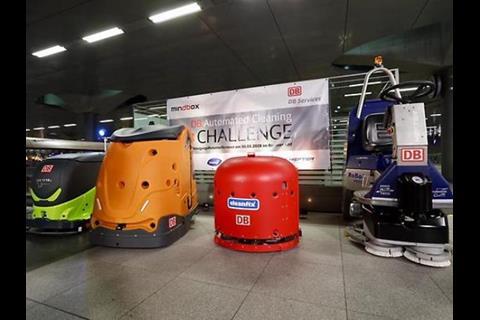GERMANY: In order to demonstrate the potential for the automation of routine station cleaning tasks, DB hosted a ‘smart scrubber’ event at Berlin Hbf on January 30.
The Automated Cleaning Challenge organised by DB Services and the DB Mindbox digital innovation lab pitted cleaning machines from four international manufacturers against each other. The winner was to be awarded a two-year framework contract to work with DB on the development of automated station cleaning systems.
The four contenders were:
• Adlatus Robotics, an Ulm-based start-up which has been developing cleaning robots since 2015 and was the winner of the PURUS Innovation Award 2017;
• Cleanfix, a Swiss company which has been supplying cleaning machines since the 1970s;
• Hefter Cleantech, a manufacturer specialising in escalator and floor cleaning machines;
• Taski Diversey, an American supplier of cleaning and hygiene systems which has also been active in the global market for cleaning robots.
The four robots were required to compete on a 200 m² course, dealing with a variety of detritus including ketchup stains and leftover chips. Their performance was assessed by a jury, taking into consideration each robot’s ability to orient itself in the station, its optimisation of cleaning routes, its reaction to both people and obstacles, the cleaning performance and quality of finish, and operational safety.
DB puts the cost for the regular cleaning of around 5 700 railway stations across Germany at ‘double-digit millions’ of euros per year. It is already using scrubber/drier machines for regular cleaning of major stations with a total floor area of more than 1·8 million m², including 15 000 m² at Berlin Hbf alone. As part of its ‘Zukunft Bahn’ quality programme, DB is looking to introduce robots to support its station cleaning teams throughout Germany.
Among the aspects of robot cleaner design to be addressed under the framework contract are optimising the navigation system and proximity sensors to ensure reliable detection of moving objects. To facilitate autonomous operation over longer periods, the robots should also be able to take themselves to a servicing point if the battery is running low, the waste water tank is full or the fresh water tank needs replenishing.
Meanwhile, as part of its cleanliness offensive DB has already introduced the capability for station users to report dirt and rubbish problems at around 240 stations using WhatsApp, so that staff can tackle the issue as soon as possible.



















